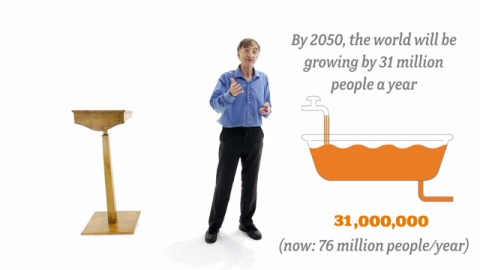Is There Room for 9 Billion of Us? Demography In A Nutshell

Editor’s Note: Over the next 12 days, Big Think will be running excerpts from all the lessons that make up our first online course, Great Big Ideas. During this period, we are offering discounted subscriptions to Big Think readers. You can now subscribe and gift this course for $99. Please sign up and then subscribe using the coupon code THINK to get the discount.
“I hope that you’ll remember that population interacts with economics, the environment, and culture so that you immunize yourself against people who will try to sell you an overly simple bill of goods.”
– Joel Cohen
What’s the Big Idea?
When will wild salmon go extinct? Why are rich countries producing fewer and fewer babies? Will there be any money left in Social Security when I retire? These are only a few of the questions that the field of Demography can help us to answer.
In this excerpt from Great Big Ideas, a new online course offered by The Floating University, multiple-award-winning mathematical biologist Joel Cohen explains that population interacts with environment, economics, and culture to shape our world. He cautions against hucksters selling easy, one-sided panaceas for the world’s problems:
Demography is the study of populations past, present, and future through mathematical modeling and statistical analysis. Its findings and predictions are deeply relevant to issues as diverse as contraception, farming, and education. For example:
What’s the Significance?
Population shifts affect everyone on the planet. For wealthy countries, aging populations and lower birth rates have huge implications – strain on Social Security systems, an increase in health care jobs, and a greater need for high and low skilled immigrants to perform necessary services and revive the economy. For poor countries, increasing populations mean greater strain on already scarce resources, which means starvation, war, and disease. And continued brain drain to wealthier nations will likely keep these countries in poverty.
The world’s gravest problems are not necessarily insoluble, but their size and complexity defy intuition and the breezy solutions of political discourse. Demography is an ever-evolving tool that can help us outpace our changing world and take better control of our destiny.
To subscribe to Floating University’s Great Big Ideas, click here.





